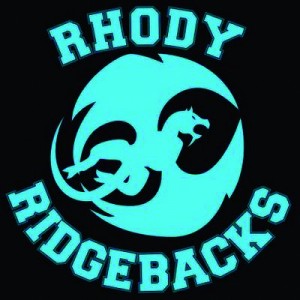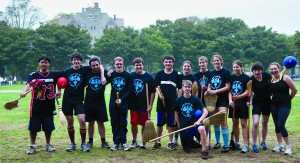Ah! It’s that time of year again! I love fall, and not just for the pumpkin spice, warm sweaters, Scituate Art Festival and because I get to set up my Harry Potter-themed classroom! It’s also because fall brings back great sports! And in my house it’s all football, hockey and quidditch, the last of which stems from J.K. Rowling’s Harry Potter series, which I love.
Muggles, such as myself, recall first reading about Quidditch and being as surprised as Harry was when he was selected to be the Seeker for a game he had never heard about. Neither had we! And throughout the series, we cheered on Gryffindor each time Harry took to the Quidditch pitch. In Rowling’s world, Quidditch is played on brooms in the air well above a stadium. (And I have to admit that now, as a parent, I question McGonagall’s relaxed attitude toward the sport!)
throughout the series, we cheered on Gryffindor each time Harry took to the Quidditch pitch. In Rowling’s world, Quidditch is played on brooms in the air well above a stadium. (And I have to admit that now, as a parent, I question McGonagall’s relaxed attitude toward the sport!)
There are some differences, of course, between the muggle sport (created in Vermont in 2005) and the fictionalized sport in Rowling’s world. For one, when you’re talking about the game from the book, Quidditch is capitalized, but the International Quidditch Association (IQA, and yes it’s a real thing!) does not capitalize it. Also, and more obvious, we can’t fly around on broomsticks; however, that has not hindered the excitement and growing popularity of the game!
The rules of quidditch are simple. There are five balls in play: the snitch, quaffle and three bludgers. Each team is made up of a seeker (Harry’s position), who chases and catches the snitch to score points and end the game. (In the books, the snitch flies, but in the muggle game, the snitch is attached to a runner.) There are three chasers who score goals by getting the quaffle through vertically oriented hoops. There are two beaters who use the bludgers to disrupt other players, and finally one keeper who guards the hoops. Easy right? There is also a World Cup (think Harry Potter and the Goblet of Fire without those pesky dementors!), which has been played in the US since 2007.
Locally, we have the Southern New England Quidditch Conference. This league is made up of collegiate teams from Rhode Island, Massachusetts and Connecticut; URI, Clark University, Wellesley, University of New Haven, UMASS Amherst and Lowell, and Smith College and Westfield University — aptly named Smithfield as they have newly merged into one team. The league also boasts two community groups: the Providence Ashwinders and the newest addition, BOSNY, a team combining NY and Boston players, proving that New Yorkers and Bostonians can come together in harmony!
I spoke with SNEQC’s commissioner Derik Wagner, a Brown University grad. He grew up loving both the Sabres and Bills, which lead to his love of team sports. In high school he was on the cross country and track team as a junior, when he first heard of quidditch outside of the novels from a senior who was planning on playing in college. He immediately began to research the sport, read the rule book and knew it would be the perfect fit for when he went to college. “I was very excited and determined that I would play when I went to college. It’s a new sport, so it wouldn’t require experience or tryouts. This was my chance!”
It’s now six seasons later and he’s playing for two teams — Providence Ashwinders and BOSNY as the chaser — because as he enthusiastically put it, “One team isn’t enough!”
 Wagner explained that beyond the World Cups here in the US, there have been three international World Cups and two European championships. He continued, “The US has expanded quidditch beyond the academic year and into the summer with the development of Major League Quidditch (MLQ), which is a very structured, semi-professional league that aims to make quidditch as consumable as possible for the public. MLQ is in 16 cities across the country and has existed for three years.” Yes, Major League, semi pro … honestly, I couldn’t be more excited as this takes my competitive nature and combines it with my love of reading!
Wagner explained that beyond the World Cups here in the US, there have been three international World Cups and two European championships. He continued, “The US has expanded quidditch beyond the academic year and into the summer with the development of Major League Quidditch (MLQ), which is a very structured, semi-professional league that aims to make quidditch as consumable as possible for the public. MLQ is in 16 cities across the country and has existed for three years.” Yes, Major League, semi pro … honestly, I couldn’t be more excited as this takes my competitive nature and combines it with my love of reading!
Younger and smaller teams play a role in the cultivation of this sport, and they sometimes face barriers to growing and competing with peers through a structured season. “SNEQC is a solution to that [problem],” said Wagner. “It is a very structured conference that has a complete and comprehensive season throughout the academic year and welcomes and is composed of primarily low-level teams. Three of our teams are part of the USQ (US Quidditch) season and our schedule accommodates them.”
Clearly with people like Derik Wagner, who are passionate about this fun and inclusive sport, quidditch will be around for the next 20 years and beyond!